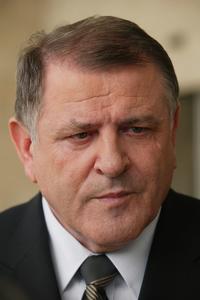Politics of Slovakia takes place in a framework of a parliamentary representative democratic republic, with a multi-party system. Legislative power is vested in the parliament and it can be exercised in some cases also by the government or directly by citizens.

Vladimír Mečiar is a Slovak former politician who served as the prime minister of Slovakia from June 1990 to May 1991, June 1992 to March 1994, and again from December 1994 to October 1998. He was the leader of the Movement for a Democratic Slovakia (HZDS), a populist party in Slovakia.

Václav Klaus is a Czech economist and politician who served as the second president of the Czech Republic from 2003 to 2013. From July 1992 until the dissolution of Czechoslovakia in January 1993, he served as the second and last prime minister of the Czech Republic while it was a federal subject of the Czech and Slovak Federative Republic, and then as the first prime minister of the newly independent Czech Republic from 1993 to 1998.
The last period in Czechoslovak history began with the Velvet Revolution from 17 to 28 November 1989 that overthrew the communist government, and ended with the dissolution of Czechoslovakia on 1 January 1993.

Social Democracy, known as the Czech Social Democratic Party until 10 June 2023, is a social-democratic political party in the Czech Republic. Sitting on the centre-left of the political spectrum and holding pro-European views, it is a member of the Party of European Socialists, the Socialist International, and the Progressive Alliance. Masaryk Democratic Academy is the party-affiliated's think tank.

The Civic Democratic Party is a conservative and economic liberal political party in the Czech Republic. The party sits between centre-right and right-wing on the political spectrum, and holds 34 seats in the Chamber of Deputies, and is the second strongest party by number of seats following the 2021 election. It is the only political party in the Czech Republic that has maintained an uninterrupted representation in the Chamber of Deputies.
The Freedom Union–Democratic Union was a small pro-European liberal political party in the Czech Republic from 1998 to 2011.

The Civic Forum was a political movement in the Czech part of Czechoslovakia, established during the Velvet Revolution in 1989. The corresponding movement in Slovakia was called Public Against Violence.

The dissolution of Czechoslovakia, which took effect on December 31, 1992, was the self-determined secession of the federal republic of Czechoslovakia into the independent countries of the Czech Republic and Slovakia. Both mirrored the Czech Socialist Republic and the Slovak Socialist Republic, which had been created in 1969 as the constituent states of the Czechoslovak Socialist Republic until the end of 1989.

Public Against Violence was a political movement established in Bratislava, Slovakia in November 1989. It was the Slovak counterpart of the Czech Civic Forum.
The Democratic Party is a centre-right political party in Bulgaria led by Alexander Pramatarski. The party was a member of the European People's Party (EPP).

The Federal Assembly was the highest organ of state power of Czechoslovakia from 1 January 1969 until the amendment of the state constitution on 23 April 1990. From 23 April 1990 until the dissolution of Czechoslovakia on 31 December 1992, it functioned as the state's federal legislature.
Parliamentary elections were held in Czechoslovakia on 26 May 1946. The Communist Party of Czechoslovakia emerged as the largest party, winning 114 of the 300 seats with 38% of the vote. The Communist vote share was higher than any party had ever achieved in a Czechoslovak parliamentary election; previously, no party had ever won more than 25%. Voter turnout was 94%. The national results also determined the composition of the Slovak National Council and local committees.

Parliamentary elections were held in the Czech Republic on 19 and 20 June 1998. The Czech Social Democratic Party emerged as the largest party, winning 74 of the 200 seats. Voter turnout was 73.9%.

National Council elections were held in the Czech part of Czechoslovakia on 5 and 6 June 1992, alongside federal elections. The result was a victory for the Civic Democratic Party-Christian Democratic Party alliance, which won 76 of the 200 seats. Voter turnout was 85.0%. When the Czech Republic became independent in 1993, the National Council became its Parliament.

Federal elections were held in Czechoslovakia on 8 and 9 June 1990, alongside elections for the Czech and Slovak Assemblies. They were the first elections held in the country since the Velvet Revolution seven months earlier. Voter turnout was 96.2%.

Parliamentary elections were held in Czechoslovakia on 26 and 27 November 1971. They were the first held after the Constitutional Act on the Czechoslovak Federation converted Czechoslovakia into a federal republic, comprising the Czech Socialist Republic and the Slovak Socialist Republic, as well as the first elections in Czechoslovakia held in the aftermath of the Prague Spring.

The Christian Democratic Party was a Christian-democratic political party in the Czech Republic, functional between 1990 and 1996. Its first chairman was Václav Benda, the last chairman from 1993-1996 the former Minister of Education Ivan Pilip.
The Liberal-Social Union was a political alliance in Czechoslovakia and the Czech Republic, existing from 1991 to 1994, and led by František Trnka.

Civic Democratic Party existed in Slovakia in 1992 and 1993. It was Slovak wing of Czech Civic Democratic Party. It was led by Ľudovít Kaník, with Iveta Radičová as its Press spokesperson. Václav Klaus formed Slovak ODS to prevent Dissolution of Czechoslovakia.














